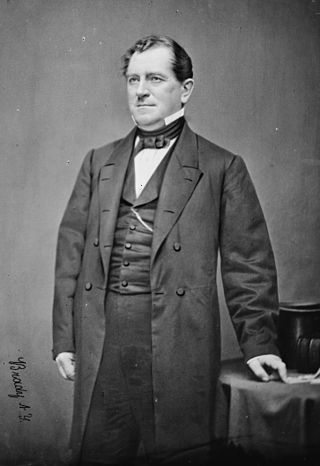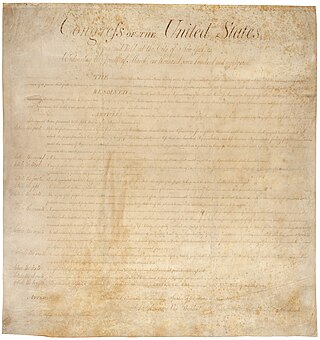
Presidential elections were held in the United States from November 1 to December 4, 1844. Democratic nominee James K. Polk narrowly defeated Whig Henry Clay in a close contest turning on the controversial issues of slavery and the annexation of the Republic of Texas. This is the only election in which both major party nominees served as Speaker of the House at one point, and the first in which neither candidate held elective office at the time.

In United States history, the gag rule was a resolution in the United States House of Representatives that forbade legislators from raising, considering, or discussing slavery. First passed in 1836 and renewed in some form in every legislative session until its repeal in 1844, the gag rule played a key role in escalating sectional tensions over slavery and galvanizing support for its abolition.
Dred Scott v. Sandford, 60 U.S. 393 (1857), was a landmark decision of the United States Supreme Court that held the U.S. Constitution did not extend American citizenship to people of black African descent, and therefore they could not enjoy the rights and privileges the Constitution conferred upon American citizens. The decision is widely considered the worst in the Supreme Court's history, being widely denounced for its overt racism, judicial activism, poor legal reasoning, and crucial role in the start of the American Civil War four years later. Legal scholar Bernard Schwartz said that it "stands first in any list of the worst Supreme Court decisions." A future chief justice, Charles Evans Hughes, called it the Court's "greatest self-inflicted wound".
The abortion debate is a longstanding and contentious discourse that touches on the moral, legal, medical, and religious aspects of induced abortion. In English-speaking countries, the debate has two major sides, commonly referred to as the "pro-choice" and "pro-life" movements. Generally, supporters of pro-choice argue for the right to choose to terminate a pregnancy. They take into account various factors such as the stage of fetal development, the health of the woman, and the circumstances of the conception. By comparison, the supporters of pro-life generally argue that a fetus is a human being with inherent rights and intrinsic value, and thus, cannot be overridden by the woman's choice or circumstances and that abortion is morally wrong in most or all cases. Both the terms pro-choice and pro-life are considered loaded words in mainstream media, which tend to prefer terms such as "abortion rights" or "anti-abortion" as more neutral and avoidant of bias.
The Mexico City policy, sometimes referred to by its critics as the global gag rule, is a United States government policy blocking U.S. federal funding for non-governmental organizations (NGOs) providing abortion counseling or referrals, advocated to decriminalize abortion, or expanded abortion services. When in effect, the Mexico City policy is a U.S. government policy that requires foreign non-governmental organizations to certify that they will not "perform or actively promote abortion as a method of family planning" with non-U.S. funds as a condition for receiving U.S. global family planning assistance, and during its January 23, 2017 implementation any other U.S. global health assistance, including U.S. global HIV and maternal and child health (MCH) assistance.

The Republic of Texas was annexed into the United States and admitted to the Union as the 28th state on December 29, 1845.
In American political discourse, states' rights are political powers held for the state governments rather than the federal government according to the United States Constitution, reflecting especially the enumerated powers of Congress and the Tenth Amendment. The enumerated powers that are listed in the Constitution include exclusive federal powers, as well as concurrent powers that are shared with the states, and all of those powers are contrasted with the reserved powers—also called states' rights—that only the states possess. Since the 1940s, the term "states' rights" has often been considered a loaded term or dog whistle because of its use in opposition to federally-mandated racial desegregation and, more recently, same-sex marriage and reproductive rights.
Prior restraint is censorship imposed, usually by a government or institution, on expression, that prohibits particular instances of expression. It is in contrast to censorship that establishes general subject matter restrictions and reviews a particular instance of expression only after the expression has taken place.
Throughout the period before the American Civil War, petitions and memorials relating to the slavery question appeared in many records of the United States Congress. Between 1836 and 1844, the 21st rule of the U.S. House of Representatives provided that no petition relating to slavery would be entertained in any way; therefore, all such petitions and memorials received while this rule was in effect were tabled.
Rust v. Sullivan, 500 U.S. 173 (1991), was a case in the United States Supreme Court that upheld Department of Health and Human Services regulations prohibiting employees in federally funded family-planning facilities from counseling a patient on abortion. The department had removed all family planning programs that involving abortions. Physicians and clinics challenged this decision within the Supreme Court, arguing that the First Amendment was violated due to the implementation of this new policy. The Supreme Court, by a 5–4 verdict, allowed the regulation to go into effect, holding that the regulation was a reasonable interpretation of the Public Health Service Act, and that the First Amendment is not violated when the government merely chooses to "fund one activity to the exclusion of another".

Joshua Reed Giddings was an American attorney, politician and abolitionist. He represented Northeast Ohio in the U.S. House of Representatives from 1838 to 1859. He was at first a member of the Whig Party and was later a Republican, helping found the party.

Charles Gordon Atherton was an American politician and lawyer from New Hampshire. He was elected to the United States House of Representatives from 1837 to 1843. He was elected to the United States Senate from 1843 to 1849 and then again in 1853. He was a Democrat.
An abortion fund is a non-profit organization that provides financial and logistical assistance to individuals who cannot afford the costs of an abortion. Abortion funds play a role in financing abortion services in countries where abortion is legal but not accessible. For example, health insurance may not cover abortion or transportation to abortion clinics may be financially or logistically infeasible. Abortion funds also provide assistance in cities, states, provinces or countries where abortion is illegal and women travel elsewhere to obtain a legal abortion.

William Slade Jr. was an American Whig and Anti-Masonic politician. He served as a U.S. Representative from Vermont from 1831 to 1843, where he was an outspoken opponent of slavery. He was the 17th governor of Vermont.

In the United States, the right to petition is enumerated in the First Amendment to the United States Constitution, which specifically prohibits Congress from abridging "the right of the people peaceably to assemble, and to petition the Government for a redress of grievances".
Christian Legal Society v. Martinez, 561 U.S. 661 (2010), is a United States Supreme Court case in which the Court upheld, against a First Amendment challenge, the policy of the University of California, Hastings College of the Law, governing official recognition of student groups, which required the groups to accept all students regardless of their status or beliefs in order to obtain recognition.
Legal Services Corp. v. Velazquez, 531 U.S. 533 (2001), is a decision of the Supreme Court of the United States concerning the constitutionality of funding restrictions imposed by the United States Congress. At issue were restrictions on the Legal Services Corporation (LSC), a private, nonprofit corporation established by Congress. The restrictions prohibited LSC attorneys from representing clients attempting to amend existing welfare law. The case was brought by Carmen Velazquez, whose LSC-funded attorneys sought to challenge existing welfare provisions since they believed that it was the only way to get Velazquez financial relief.

Freedom suits were lawsuits in the Thirteen Colonies and the United States filed by enslaved people against slaveholders to assert claims to freedom, often based on descent from a free maternal ancestor, or time held as a resident in a free state or territory.
Like most contemporaries, John Quincy Adams's views on slavery evolved over time. He never joined the movement called "abolitionist" by historians—the one led by William Lloyd Garrison—because it demanded the immediate abolition of slavery and insisted it was a sin to enslave people. Further, abolitionism meant disunion and Adams was a staunch champion of American nationalism and union.

In the District of Columbia, the slave trade was legal from its creation until it was outlawed as part of the Compromise of 1850. That restrictions on slavery in the District were probably coming was a major factor in the retrocession of the Virginia part of the District back to Virginia in 1847. Thus the large slave-trading businesses in Alexandria, such as Franklin & Armfield, could continue their operations in Virginia, where slavery was more secure.








